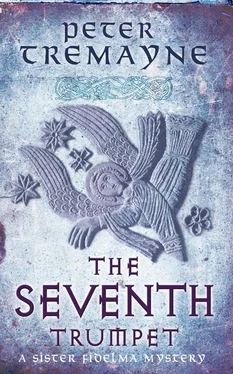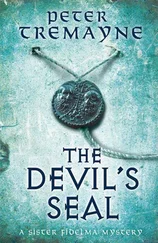Peter Tremayne - The Seventh Trumpet
Здесь есть возможность читать онлайн «Peter Tremayne - The Seventh Trumpet» весь текст электронной книги совершенно бесплатно (целиком полную версию без сокращений). В некоторых случаях можно слушать аудио, скачать через торрент в формате fb2 и присутствует краткое содержание. Год выпуска: 2012, ISBN: 2012, Издательство: Headline, Жанр: Исторический детектив, на английском языке. Описание произведения, (предисловие) а так же отзывы посетителей доступны на портале библиотеки ЛибКат.
- Название:The Seventh Trumpet
- Автор:
- Издательство:Headline
- Жанр:
- Год:2012
- ISBN:9780755377527
- Рейтинг книги:5 / 5. Голосов: 1
-
Избранное:Добавить в избранное
- Отзывы:
-
Ваша оценка:
- 100
- 1
- 2
- 3
- 4
- 5
The Seventh Trumpet: краткое содержание, описание и аннотация
Предлагаем к чтению аннотацию, описание, краткое содержание или предисловие (зависит от того, что написал сам автор книги «The Seventh Trumpet»). Если вы не нашли необходимую информацию о книге — напишите в комментариях, мы постараемся отыскать её.
The Seventh Trumpet — читать онлайн бесплатно полную книгу (весь текст) целиком
Ниже представлен текст книги, разбитый по страницам. Система сохранения места последней прочитанной страницы, позволяет с удобством читать онлайн бесплатно книгу «The Seventh Trumpet», без необходимости каждый раз заново искать на чём Вы остановились. Поставьте закладку, и сможете в любой момент перейти на страницу, на которой закончили чтение.
Интервал:
Закладка:
‘A good point,’ Fidelma agreed. ‘But there is another possibility — that whoever did this could have been standing on an elevated piece of ground or a rock behind the victim.’
Eadulf looked round at the muddy bank and the stream. ‘Nothing I can see fits such a theory.’
‘Perhaps his attacker was on horseback while his victim was on foot.’ Fidelma began examining the muddy ground of the bank. She then turned and nimbly crossed the stepping-stones to the far bank and repeated her search. She returned without saying a word.
Tóla was helping Eadulf put back the upper clothing on the corpse.
‘We will have to remove the body to somewhere in preparation for burial,’ Eadulf stated.
‘There is a little chapel and burial-ground not far from here at Fraigh Dubh — the Black Heath. It is on the highway that leads south by the heathland into Cashel,’ said Tóla. ‘There is a new priest there, but I do not know him.’
‘It would surely be better to learn the victim’s identity before the burial — especially as he seems to belong to the nobility,’ Eadulf observed.
‘But that will take time, and we cannot leave him unburied,’ Fidelma argued. ‘It is a practical matter.’
Eadulf acknowledged that she was right. He bent to rearrange the clothing on the corpse. Suddenly, he withdrew his hand, uttering an exclamation, and put his fingers to his mouth.
‘What is it?’ Fidelma demanded.
‘Something sharp,’ he replied. ‘A prick from a splinter, probably.’ He knelt to find out what it was that had hurt him. Something was protruding from the sword sheath. ‘Curious,’ he muttered. ‘It’s a broken piece of wood in its own little leather sheath, tied to the sword belt.’
Fidelma carefully unhooked the small leather sheath and removed the broken piece of wood. It was a short wand of white wood — rowan, she thought. The top had been snapped off but there was some evidence of gold binding on the lower part.
She breathed out sharply as she recognised it.
‘Does that mean something to you?’ Eadulf queried, seeing her expression.
‘It means that this man was an envoy or of equivalent rank,’ she said. ‘Not only was he wearing a brooch with the emblem of the Uí Máil, the Kings of Laigin, but he was carrying the wand of office of an envoy. Sometimes even chieftains of high rank carry such wands to proclaim their office.’
Eadulf knew that this was the custom of Fidelma’s people. He also knew that, under the law, the life of a herald or an ambassador was inviolate, even during warfare. Neither harm nor injury could be visited on such an official for, if harm was done, blood feuds could carry from one generation to another until reparation was made. It was a heinous crime, and the punishment for the perpetrator was great.
Gormán, who had been standing a short distance away with Enda holding their horses, now took a step forward, having overheard the conversation.
‘But what would an envoy from the King of Laigin be doing alone and on foot in this place?’
‘That’s a good question, Gormán’, Fidelma said. ‘One that needs an answer, and very soon. It seems inconceivable that such a noble or an ambassador was travelling alone here on foot in the darkness. That is why I was looking at the muddy banks of this stream. I am afraid our horses must have obliterated any signs of tracks at this point. So, if this ambassador came here on horseback, which way would he have come?’
The question was addressed to Tóla. The farmer immediately pointed to the west.
‘This stream flows into the great river, the Suir, not far from here. As you know, lady, this crossing is usually used only by local people who travel on the track along the east bank of the river and then turn inland along this stream to cross at this ford and continue their journey to Cashel. From the east, there would be no reason to come in this direction since there is a good highway there which leads all the way to Cashel.’
‘So if this man came from the Suir, he could have ridden down along the eastern bank to turn along this stream to cross here on his way to Cashel?’ asked Eadulf.
‘That presents other questions,’ interposed Gormán after Tóla had agreed. ‘A man of this elevated rank would surely have an entourage or a companion and, as such, would have taken the main highway where there are hostels for such travellers. So he would have followed the road to the east of here, not the west.’
‘Whichever way he came, lady,’ Tóla said, ‘the paths to this point from both west and east are on my farmlands, and my livestock wander freely. The mud is always turned, as you see. I doubt whether you could trace any individual horses along it. And as you said, lady, why would an ambassador, on his own or with an entourage, be coming through this place after nightfall?’
Fidelma suddenly let out an exclamation which caused everyone to start. ‘What a fool I am!’ She turned to Tóla. ‘You say that you found the body this morning?’
‘It was exactly as I told you, lady. It was just after first light that I had come down here to find whether my heifer had produced her calf.’
‘When were you at this spot before that?’
‘As dusk approached last night. The heifer was in the field behind us. I was worried for her as she was overdue with her calf and so I came to look at her.’
‘Did you look at this crossing at that time?’
‘I did not. However, the body was not here.’
‘How do you know that?’
‘Because the stream was running freely.’
‘I do not understand,’ Eadulf said.
‘I was alerted to the body being in the stream by the fact that it was being pushed by the current against those stepping-stones and thereby forming a dam. The water makes a different noise when it is allowed to flow freely. Also, my dog, Cú Faoil, was at his ease when we were here last night, whereas this morning he was nervous and showing signs that something was untoward. His behaviour prompted me to find the body.’
‘So there is yet another conundrum,’ breathed Fidelma. ‘The logical conclusion is that this ambassador came here alone in the darkness or with a companion who was his assassin. If they were both on horseback, then the young man was obliged to dismount at the crossing while his companion, still seated on his horse, stabbed him from that superior height. Afterwards, the assassin must have led both horses away without alarming anyone. Not even your dog was awoken during the night, Tóla.’
‘If there had been any disturbance, however slight, Cú Faoil would have surely raised an alarm,’ agreed the farmer. ‘There is nothing that escapes his attention.’
‘There is another answer to that conundrum.’ It was Eadulf who spoke.
Fidelma turned to him in slight surprise. ‘Another answer?’
‘What if the man was killed elsewhere and then brought in stealth to this place? The body could have been dumped here by someone thinking it was an out-of-the-way spot where it would not be discovered.’
There was a pause while Fidelma considered this. ‘It is a good point,’ she conceded. ‘But if the murderer brought the body here, thinking it a good hiding-place, surely the stepping-stones across the stream would have warned him that it was not so remote, and that people used the crossing. There are plenty of better places around here to hide a body. And why leave so many clues behind, like his Uí Máil emblem? Why leave part of his wand of office, showing he was an envoy? Indeed, why not just remove all his valuable jewellery, the dagger, sword and so on? In fact, why not strip the body entirely, which would have made the task of identification almost impossible?’
‘Of course, if the murder was done here, perhaps the killer left these things on the corpse because they heard someone coming and had to flee,’ Eadulf suggested.
Читать дальшеИнтервал:
Закладка:
Похожие книги на «The Seventh Trumpet»
Представляем Вашему вниманию похожие книги на «The Seventh Trumpet» списком для выбора. Мы отобрали схожую по названию и смыслу литературу в надежде предоставить читателям больше вариантов отыскать новые, интересные, ещё непрочитанные произведения.
Обсуждение, отзывы о книге «The Seventh Trumpet» и просто собственные мнения читателей. Оставьте ваши комментарии, напишите, что Вы думаете о произведении, его смысле или главных героях. Укажите что конкретно понравилось, а что нет, и почему Вы так считаете.











